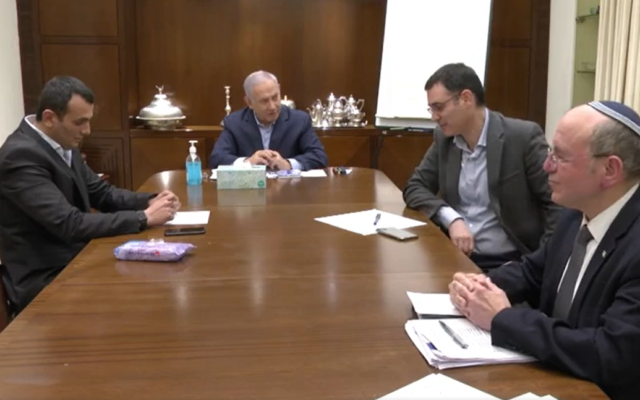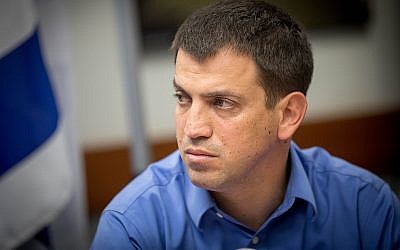PM has always sought to sideline competing ministers and make all the decisions himself; that strategy served him well in the first wave of the virus, but then he got distracted
By HAVIV RETTIG GUR, TOI 19 July 2020,

Prime Minister Benjamin Netanyahu wears a face mask to help prevent the spread of the coronavirus as he chairs the weekly cabinet meeting, at the foreign ministry, in Jerusalem, July 5, 2020. (Gali Tibbon/Pool via AP)
The coronavirus pandemic arrived in Israel in mid-February. Prime Minister Benjamin Netanyahu seemed up to the task.
He led regular televised briefings announcing each new stage of social-distancing restrictions. At his side, each time, were top officials of the state bureaucracy, especially the directors of the Health and Finance ministries, Moshe Bar Siman-Tov and Shai Babad respectively.
Cabinet ministers, on the other hand, were nowhere to be found during the most dire crisis Israelis could remember. Then-finance minister Moshe Kahlon and then-health minister Yaakov Litzman (now the housing minister) openly admitted they were uninvolved, and seemed happy about that fact.
“Barsi” (Bar Siman-Tov’s nickname) and Babad would become household names over the course of March and April — and would lead polls alongside Netanyahu on whom Israelis most trusted to handle the coronavirus emergency.
Netanyahu has spent the better part of the past decade consolidating power in the Prime Minister’s Office and dealing directly with the rest of the bureaucracy, usually over the heads of cabinet ministers. It is an impulse that has seen the expansion of the National Security Council and Mossad – both directly answerable to the premier – and the commensurate gutting of the Foreign Ministry and other policymaking bodies.

From left to right: Then-Finance Ministry director general Shai Babad, Prime Minister Benjamin Netanyahu, then-Health Ministry director general Moshe Bar Siman-Tov and National Security Adviser Meir Ben-Shabbat at the Prime Minister’s Residence in Jerusalem on March 22, 2020. (Screen capture: Twitter)
Netanyahu prefers to work directly with the bureaucrats, and, his supporters say, that fact has streamlined policymaking and removed some of the populist pressure that once led Israeli governments to irresponsible spending and bad policies. Israel is stronger for it.
Witness the first wave of infections. Israel’s powerful, assertive and competent bureaucracy worked directly with and for Netanyahu — and delivered one of the fastest and most decisive responses to the pandemic of any government on earth. Israel closed its skies to flights from Beijing and Rome before most nations, even drawing rebukes from those governments. While America, Italy, Spain, Iran and many others became cautionary tales of a pandemic spiraling out of control, Israel was an exemplar of what fast and smart policy decisions could accomplish in an emergency.
Then it wasn’t.
The PM loses focus
Where the government should have spent those hard-won weeks of a “flattened curve” building out an epidemiological “tweezers” capability — the ability to mass-test the population, pluck infected individuals out of the general population and into isolation, and allow the general economy to remain open without repeated waves of shutdowns – Netanyahu instead was focused elsewhere. After a decade of consolidating bureaucratic power until he was nearly the lone master of the political domain, his distraction meant little could move forward.
A “historic” West Bank annexation drove the political agenda for the better part of June. A full day of debate in the Knesset Finance Committee late in the month was taken up with the question of granting Netanyahu, a wealthy man, retroactive tax breaks on state funding for his Caesarea villa — a day of committee work invested on Netanyahu’s personal finances while a desperately needed economic rescue bill failed to advance.

Israeli social workers protest their working conditions outside the Knesset on June 25, 2020. (Yonatan Sindel/Flash90)
Netanyahu would later apologize for the “timing” of that debate. But by early July, as the second wave threatened to impoverish new constituencies and send hundreds of thousands more Israelis out of work, it became increasingly clear that Netanyahu’s distractions were more than a public relations problem. An unprepared government had squandered the sacrifices of the first shutdown.
Turnover
There was another difference between the first and second waves of infection: by June, Netanyahu no longer controlled the key bureaucrats.
Health Ministry director Bar Siman-Tov – part of the fiscally cautious “Treasury youth” subculture in Israel’s government that Netanyahu has always supported and advanced – had worked directly with Netanyahu while minister Litzman stayed out of the way. But after the May 17 swearing-in of the new unity government, a new health minister had arrived. Yuli Edelstein is a powerful figure in Likud able to demand a real role in the decisionmaking.

Health Minister Yuli Edelstein speaks during a press conference about the coronavirus at the Health Ministry in Jerusalem, on June 28, 2020. (Olivier Fitoussi/Flash90)
“Barsi” was out, replaced with a new Health Ministry director general, physician and hospital administrator Chezy Levy. Levy doesn’t have the prime minister’s ear and has no intention of bypassing his minister to obtain it. Where Bar Siman-Tov’s role was more often than not to be the fiscally conservative government’s representative bearing bad news to the health care system, Levy prefers to serve as the voice of the hospitals and medical associations to what they consider an out-of-touch and stingy government.
It’s a similar story in the Finance Ministry. Finance Minister Katz, like his colleague Edelstein, is a popular figure in the Likud rank and file. And the new director general of his ministry, Keren Terner Eyal, is a close confidante of the minister. Like “Barsi,” Terner Eyal began her public service career as a “Treasury youth” in the Budgets Department, rising quickly through the ranks of the department and specializing in transportation budgets. She made the leap to the Transportation Ministry in 2011. By 2014 she was deputy director general, and in 2016 was appointed director general by then-transportation minister Katz. Katz brought her with him to the Finance Ministry.

Keren Terner Eyal, then-director-general of the Transportation Ministry, attends a hearing at the Knesset, on March 20, 2017. (Yonatan Sindel/Flash90)
The first wave of the virus met an Israeli state led by a centralizing chieftain in de facto control of all the relevant state bodies. Israel responded swiftly and effectively.
The second wave required a different sort of response. Many agencies of government, led by competing politicians, had to band together to forge a complex pandemic response that no one agency could piece together alone. That’s when Netanyahu’s personality and governing methods failed him.
Blame game
His approval ratings dropped precipitously as Israelis watched their livelihoods evaporate and came to believe the fault lay not with the virus alone, but with the government’s mismanagement.
Two journalists, Ben Caspit and Yinon Magal — the former a vociferous critic of Netanyahu, the latter a passionate defender — have been interviewing ordinary Israelis about how they are coping with the pandemic.
In one memorable exchange, they sat down last week with Meir Micha, the famed owner of the iconic Pinati hummus restaurant in downtown Jerusalem, a symbol of Jerusalem’s Mizrahi working class and a lifelong Likud supporter.

Meir Micha, left, owner of the iconic Jerusalem hummus eatery Pinati, talks to journalists Ben Caspit, right, and Yinon Magal, unseen, at the Jerusalem establishment, July 2020. (Twitter screen capture)
Asked if he was critical of Netanyahu, Micha had this to say: “Why do we have to reach this point, after 40 years, where I can’t pay my suppliers? Why? He’s dealing with his pool, with the water in his pool [one of the elements of Netanyahu’s villa care for which he sought tax breaks]. What are you even talking about? He used to be a god to us, Bibi.”
No longer.
Regular protests against Netanyahu have been held for months, but saw mostly older political activists in attendance. Last week, they were suddenly joined by new cohorts of out-of-work 20- and 30-somethings.
It was a worrying sight for the prime minister, those young people outside his official residence in Jerusalem. With hundreds of thousands now unemployed, such protests had the potential to swell quickly and reshape the political reality.
Big spender
Netanyahu leaped into action, last Wednesday suddenly announcing a NIS 6 billion ($1.74 billion) plan to hand one-time grants of between NIS 750 ($218) and NIS 3,000 ($872) to all Israelis. The plan was mocked and derided, with politicians and bureaucrats alike complaining that the payouts made no distinction between those who needed the money and those who didn’t, and that a government facing a historic deficit could ill afford such populism.

Demonstrators protest against Prime Minister Benjamin Netanyahu outside the PM’s official residence in Jerusalem on July 18, 2020. (Olivier Fitoussi/Flash90)
But more significant was the way the decision was made. Ministers were left out of the loop. So were the bureaucrats, the very heart of the state apparatus with which Netanyahu once so closely identified.
No staff work was done, said the Finance Ministry officials charged with disbursing the funds. No one was consulted. Finance Ministry Director General Keren Terner Eyal heard about it the day before it was announced publicly. Bank of Israel Governor Amir Yaron heard about it on the radio.
Budgets chief Shaul Meridor told ministers he was struggling to piece together a state budget that kept changing based on such whims.
Meridor’s criticism became public. It drew sharp and angry rebukes from Netanyahu and his political aides.
“For clerks to try to control the state, against the wishes of the elected leaders, is anti-democratic,” fumed Likud MK Shlomo Karhi, one of a handful of backbenchers who have taken on the role of delivering the kind of strident rhetoric Netanyahu wants the public to hear but doesn’t want to say himself.

Finance Ministry budgets director Shaul Meridor attends a press conference at the Finance Ministry in Jerusalem on December 11, 2017. (Yonatan Sindel/Flash90)
“The Budgets Department head, Shaul Meridor, is torpedoing every decision by Netanyahu to send money and aid to the self-employed and unemployed, and is briefing [journalists] against the government,” Karhi charged in a tweet that included an unflattering mugshot of Meridor.
Netanyahu’s son Yair, sometimes seen as a bellwether of the pro-Netanyahu activist base, chimed in. “The truth is that the treasury clerks are ‘sabotaging’ and refusing to transfer the funds to the self-employed and unemployed in order to incite the people. The clerks are mobilized against Netanyahu’s policies.”
(The Hebrew word Yair Netanyahu used for “sabotaging” was mehablim, which also refers to terrorists, and he put it in quotation marks so no one would fail to notice.)
Once the ground had been prepared, Netanyahu waded in himself, retweeting Karhi and adding, “It’s inconceivable that clerks are briefing [reporters] against decisions made by the government and trying to disrupt them. We won’t accept that.”
Netanyahu had found his saboteur (or even “terrorist”). The very treasury officials Netanyahu had always viewed as his army of responsible managers, his mechanism for sidestepping competing politicians, were now the enemy working feverishly “to incite the people.”

People scuffle with police at a protest against the government’s new restrictions to contain the spread of the coronavirus, in Tel Aviv on July 18, 2020. (Miriam Alster/Flash90)
The treasury fights back
Meridor, no stranger to blustering politicians, has held firm.
“We won’t stop voicing our view, even if they” — the politicians — “don’t like to hear it,” he said on Thursday. He warned that Netanyahu’s six-billion-shekel stopgap won’t meaningfully help Israelis, while convincing many that the government’s economic relief was a politicized process. It would make it harder to demand more sacrifices from the public down the road.
“Trust is something that takes a long time to build, and is destroyed pretty quickly,” he warned.
In a sign of the new reality of competing powerbases outside the Prime Minister’s Office, Meridor had a defender: his director general Keren Terner Eyal, who issued a statement that voiced the surprise and frustration felt by treasury officials at the assault from their longtime patron Netanyahu.
“It’s very hard for me to stay quiet in the face of the unprecedented criticism of ministry staff, specifically the head of budgets Shaul Meridor, and generally of the violent discourse that has developed on social media,” she said.

Prime Minister Benjamin Netanyahu (center) and Finance Minister Israel Katz (right) meet with representatives of self-employed Israelis and small business owners at the Prime Minister’s Office in Jerusalem, July 10, 2020. (PMO)
“The professional echelon in the treasury, management and Shaul Meridor specifically,” she added, “are all working around the clock to offer a professional and ethical voice that considers the well-being of the public today and in the future, together with the implementation, to the letter, of all the decisions of the elected echelon. That’s how it’s been, and that’s what we will continue to do.”
And less delicately: “The successful handling of the economic crisis and of this time, which is unlike anything we’ve ever known, demands of us first and foremost honesty and integrity.”
Terner Eyal’s comments drew a rebuke from Katz, who said she should not be seen criticizing the elected echelon. Katz’s rebuke was so gentle that it was clear to observers, and to Terner Eyal, that it was meant to protect her, to put the issue to rest quickly in order to head off further fuming by Likud backbenchers eager for Netanyahu’s approval.
Desperate measures
It is hard to think of a time when Netanyahu was more vulnerable. His corruption trial is moving forward. The distractions and politicking that characterized much of May and June have sparked a backlash and a steep drop in public trust. Even junior lawmakers no longer fear his wrath.
And most troubling of all for Netanyahu, he is forced to resort to the sort of expensive populism that he has spent a career trying to uproot from the public service, and now finds himself in a fullblown fight with his closest policy allies in the state apparatus.

An anti-government protester dressed as a clown and wearing a mask due to the coronavirus pandemic raises a sign reading ‘The emergency government is a sad joke’ during a demonstration in Charles Clore Park in Tel Aviv on July 18, 2020. (Jack Guez/AFP)
It must be said: There are valid reasons to question the treasury’s culture of fiscal conservatism at a time of economic collapse. Netanyahu has argued that his six-billion-shekel grant was essentially a stimulus program, and sending everyone a check was faster than establishing complex criteria for recipients that could tie up the money in bureaucracy.
But that substantive debate was not held when he decided on the plan. Alternatives were not sought from the very agencies he had once viewed as his policymaking home turf, and no stimulus was even imagined as long as his polling numbers remained high. Even now, no debate about a broader stimulus package is underway. The plan amounts to a stopgap developed overnight in the closed confines of the PMO.
Netanyahu never worked well with fellow politicians, preferring to lean on the bureaucrats to manage the state responsibly and effectively. Now disconnected from the clerks, while the second wave of the pandemic gathers steam and the economic emergency deepens, it is no longer clear how he intends to right the ship and steady the economy. The leadership ranks he has traditionally relied upon in the bureaucracy are shrinking steadily as he flees the public’s wrath by blaming everyone else. There may soon be no one left in that policymaking circle but his political campaigners.
Last week, at the height of the panic that sparked the new spending binge, Netanyahu issued an order to all ministers to develop “an exit plan for safely leaving the coronavirus restrictions” for whatever part of the economy or society that was under their ministry’s purview – and to have the plan ready to present to the government by this Thursday.
Netanyahu knows he dropped the ball, knows he’s running out of people to blame, and now hopes that setting aside all other distractions and getting the government back to work will win the public’s forgiveness.
Desperate times call for desperate measures: He’s even asked cabinet ministers to start making some of the decisions.



“The Health Ministry has previously taken flak for what were criticized as overly-dire forecasts about the pandemic, including its warning that 5,000 people could require ventilators in a second outbreak.
According to the latest ministry figures, there have been 53,559 infections in Israel as of Tuesday evening, including 30,488 active cases.
The data showed 1,883 new cases recorded over the past day and two more deaths since the morning, bringing the national toll to 424.
People wearing face masks walk in the Mamilla Mall in Jerusalem on July 21, 2020. (Yonatan Sindel/Flash90)
The number of people in serious condition stood at 256, including 77 on ventilators. There were 129 people in moderate condition and the rest had mild or no symptoms.” From today’s TOI.
Notice less than 1 per cent of all “cases” are in serious condition. About 1.5 are in serious or “moderate” condidition.98.5 have “mild or no symptoms.” One death for every 15,000 active “cases. The death rate has obviously declined precipitously since April. The panicky closures are sheer madness.
Is China goal the destabilization of the “Great and little Satans”? The US and IL for those who do not get it. The new China-Iran alliance with or without Putin!
Both Trump and Bibi attacked by the same type of enemies! At the same time! Coincidence!
So far Germany is with Putin-Xi-Khamenei! Strange alliance. All four are or have experienced the worst kind of fascism recently or now!